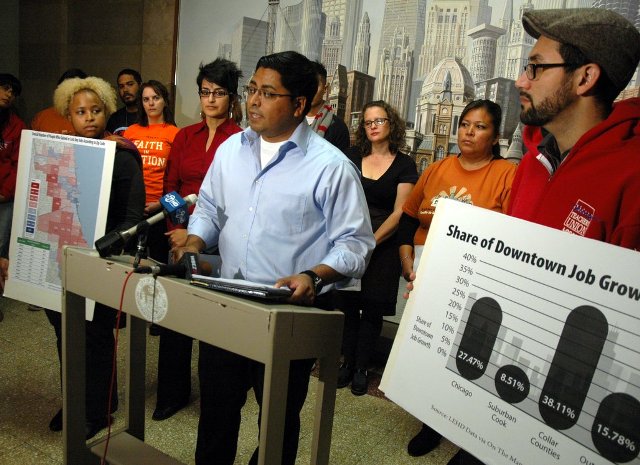New Study Shows Downtown Reaps Benefits Of TIF Funds While Neighborhoods Suffer
By aaroncynic in News on Oct 10, 2013 1:30PM

Photo credit: Chicagoist/aaroncynic
A new report released by the Grassroots Collaborative shows that while downtown Chicago continues to prosper from tax increment financing, the City’s neighborhoods are struggling. Additionally, the study shows that wealthier, mostly white suburban areas benefit significantly from economic development downtown while black and Latino neighborhoods within the city limits suffer job losses.
“For struggling black and brown neighborhoods, Chicago is cutting jobs and depressing the local economy,” said Amisha Patel, executive director of the Grassroots Collaborative at a press conference inside City Hall Wednesday. Data from the report shows that while 52,404 new jobs were created between 2002 and 2011, only one in four of those jobs went to residents of Chicago. From 2004 to 2008, the City spent $1.2 billion in TIF funding, intended for development in “blighted” areas, on the Loop. By 2011, white majority ZIP codes saw an increase of 509 downtown jobs, but black and Latino majority ZIP codes saw losses of 620 and 381 respectively. In total, Chicago’s neighborhoods saw a loss of 10,121 jobs between 2002 and 2011.
“The city should not be endorsing policies that shift more money to a smaller part of the city. For all the city to do well, all its residents need to do well,” said Eric Tellez, data and research manager with the Grassroots Collaborative. "Prioritizing downtown development to the exclusion of neighborhoods is an economic development strategy that’s failing most people in the city.”
In order to help the City’s neighborhoods prosper, the group recommends porting TIF money from wealthier downtown areas to blighted communities. Additionally, the report calls for an increase in the minimum wage, creating living wage requirements within city subsidy programs and a “commuter tax.” The tax would be “a means to compensate the city for the infrastructure and service costs needed to handle commuter traffic,” the report says.
The Grassroots Collaborative, which is comprised of 11 different organizations including Action Now, the Chicago Teachers Union, SEIU and others, is also calling for a “public town hall meeting” at 6pm on Oct. 15 at the UIC forum. A march, which the group says will draw thousands, will take place prior at 5 p.m.